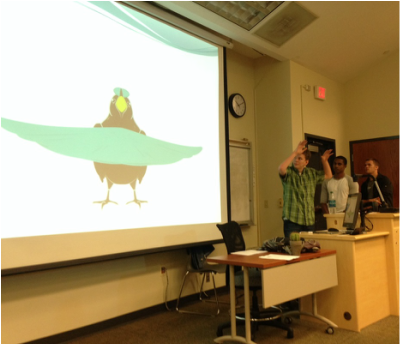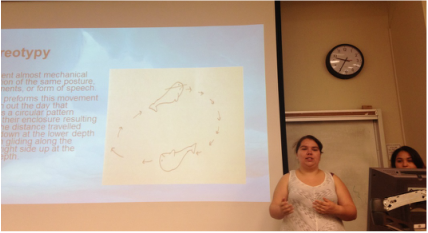
June 3, 2015: Ben Turner, Dylan Jones, and Eric Chapman talked to the class about the unique courtship behavior of the endemic Birds-of Paradise found in Papua New Guinea. As you can see from the picture, we even got a bit of a demonstration from Dylan! Female BOPs can be very choosy since the sex ratio favors males.
The exaggerated behavior and plumage trait (found only in males) is potentially a honest signal of “quality” for the males, which may translate into a handicap (ie, such honest signals are costly to the signaler, so only the best can afford to exhibit these traits). What are the
variables that may selectively drive this “quality”/handicap, you may ask? Since there are not many predators of the adults in PNG (besides humans), predation is unlikely a driving force of the honest signal. Other potential variables could be parasites and foraging ability. Can you think of any others?

June 3, 2015: We Skyped with Dr. Kevin Kohl and learned about how white-throated woodrats, who specialize on eating cacti pulp, evade cacti spines by removing them before consumption. The idea for the study came from observations that the woodrats brought the removed spines back to their middens. We also learned that there's usually a trade-off between chemical and mechanical defenses in the plants (including cacti); therefore, it's interesting to think what kind of defenses that the cacti could counterevolve to deter the specialist woodrats. Great article and great Skype Kohl, K. D., Miller, A. W., & Dearing, M. D. (2014). Evolutionary irony: evidence that ‘defensive’plant spines act as a proximate cue to attract a mammalian herbivore. Oikos.

May 29, 2015: Adam Pietri and Marisa Wolfe presented on zebra shark courting behavior. One burning questions was: Why do males often bite female caudal fins instead of pectoral fin during courtship? The answer is likely that males have difficultly accessing the cloaca because they are bottom feeders so males spin females by the tail to gain access.

June 1, 2015: Jessica Godoy and Kylie Bryant-Rider presented on stereotypy behavior in beluga whales today. One interesting question was whether the specific stereotypy behavior displayed by Aurora (mother beluga) in captivity at the Vancouver Aquarium was genetically passed on to her offspring Qila? The answer is unknown but Aurora and Qila display different stereotypy behaviors; genetics behind captivity stereotypy unknown but the traits are likely plastic (rather than inherited).

May 27, 2015: We Skyped with my friend and Galapagos colleague Dr. Jeff Podos from the University of Massachusetts - Amherst. We read his co-authored manuscript on display behavior of blue-black grassquits. They found an interesting trade-off between vigor (quantity) and skill (quality) of the males' display; males that had a better performance did so at a slower rate and vise versa. So, which do females prefer, more vigor or skill? Dr. Podos hinted that they may have data suggesting that males with more skill get the ladies. We are staying tuned for a follow up study!